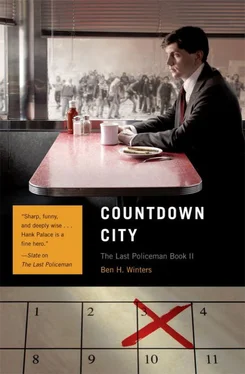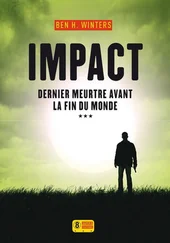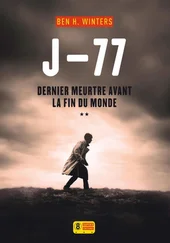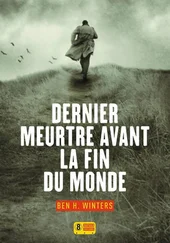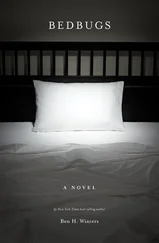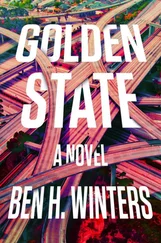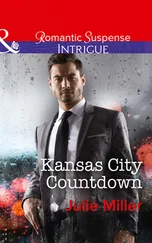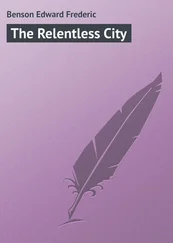Culverson leans back in his seat; McGully stares back at us in silence.
“Wow,” says Culverson. “Where to?”
“New Orleans,” says McGully. “I’m going to hoof it to 95, look for a southbound bus.”
Culverson nods. I don’t say anything. What is there to say? In the corner of my eye, Ruth-Ann is ramrod straight at the counter, carafe in hand, watching McGully in her doorway.
“You tell Beth?” Culverson asks.
“Nah.” McGully flashes his monkey’s grin, real quick, and then looks down at the floor. “I’ve been telling her, you know, we should get outta here, we should make a change, but she’s… she’s settled, you know? She’s not leaving the house. Her mom died in that house.” He looks up, then down again, mutters into his shirtfront. “I left her a note, though. Little note.”
“Hey,” I say. “McGully—” and he says, “No—no, you shut up,” and I say, “What?” and then suddenly he’s hollering, furious, stalking across the diner toward me. “You’re like a little kid, you know that?”
He leans over me in the booth. I shrink back.
“In your tidy little universe, with your notebooks, and the good guys and the bad guys. That shit is moot, man. That shit is over.”
“Easy,” says Culverson, half rising, “take it easy now,” but McGully keeps his finger in my face. “You just wait until the water runs out. You just fucking wait.” He’s snarling, showing his teeth. “You think this trooper you’re looking for, you think he’s a bad guy? You think I’m a bad guy?”
“I didn’t say that,” I murmur, but he’s not listening. He’s not talking to me, not really.
“Well, you wait until the taps stop working. Then you’ll see some fucking bad guys.” He’s bright red. He’s out of breath. “Okay?”
I don’t say anything, but he seems to want an answer. “Okay,” I say.
“Okay, smart guy?”
“Okay.”
I meet McGully’s eyes and he nods, eases off. No one else says anything. The boots squeak on the linoleum as he turns around, Ruth-Ann tsk-tsking at the scuff he’s leaving on her floor. Then the door chimes, and he’s gone: off and running. We look at each other for half a second, me and Culverson, and then I stand up, my oatmeal untouched on the table.
“So,” says Culverson mildly. “UNH, huh?”
“Yeah. Just a day, I figure. There and back.”
He nods. “Yup.”
“The only thing is, there’re these kids.” And I tell him about Micah and Alyssa, the business with the sword, and he says sure, he says he’ll look into it. We’re talking quietly, carefully, not moving much, McGully’s angry energy still buzzing around the room.
I tear the relevant piece of paper from my notebook, and Culverson tucks it into his shirt pocket.
“Go on ahead, Henry. Solve your case,” he says. “Get it right.”
* * *
I sit on my bus bench across the street from Next Time Around, the vintage clothing store, for thirty seconds, a minute maybe, gathering my nerve. Then I stand up, march over there, and knock on the front door.
No one answers. I stand there like a dummy. Somewhere farther down Wilson Avenue there’s a loud, muffled clang, like someone banging two trash can lids together. I knock again, harder this time, loud enough to rattle the glass panes of the door. I know they’re in there. I’m bending to peek in the curtained window when the door is jerked open and here’s the fat young man with the greasy hair, wearing a wool cap despite the heat.
“Yeah?” he grunts. “What?”
“My name is Henry Palace,” I begin, and Nico rushes over, rushes right around this guy’s hunched frame to hug me like a maniac.
“Henry!” she says. “What the hell?” But she’s happy, grinning, stepping back to look at me and then forward to hug me again. I take a look at her, too, take her in, my sister: a man’s white undershirt and camouflage pants, an American Spirit hanging like a lollipop stick from the corner of her mouth. Her hair has been cut short and choppy and dyed black; the change is dramatic and entirely for the worse. But her eyes are the same, twinkling and wicked and brilliant.
“I knew it,” she says, looks up at my face, still grinning. “I knew I hadn’t seen the last of you.”
I don’t reply, I smile, I peer past her into the cluttered room, the rolling racks and overspilling bins of clothes, the mannequins arranged in a variety of obscene poses. There’s a man in there on the floor asleep, shirtless, in a tangle of sheets, a woman sitting Indian-style, dealing herself a hand of cards. There’s an ersatz table, just a piece of plywood laid across two sawhorses, strewn with drawing paper and old newspapers. The store smells like must and cigarettes and body odor. The squat man in the wool cap leans across the prone body of the sleeper to reach a Bunsen burner and light his cigarette on its blue flame.
“So, what’s up?” says Nico. “What do you want?”
What I want, suddenly and fiercely, is to get my sister the hell out of this filthy squat, to extract her like one of those private detectives who pull kids from cults and reunite them with their parents. I want to tell her she has to leave this—this—this dorm, this hostel, this squalid storefront where she has decided to spend the last days of human history bedded down with this collection of lice-infested conspiracy theorists. I want her to give up whatever fantasies are driving her actions at this point and come stay where I can see her. I want to scream at her that for God’s sake she is all I have left, she’s the only person still living that I have a claim on, and her poor decision-making makes me depressed and furious in equal measure.
“Hen?” says Nico, dragging on her cigarette and blowing the smoke out her nose.
I don’t say any of those things. I smile.
“Nico,” I say. “I need your help.”
PART THREE
Signs and Shibboleths

If I can find the woman, I’ll have the man.
Culverson’s right. When you look at it objectively, my plan is a long shot at best. It’s the plan of a rookie or a plum fool: going to look for a person in the one place in New England where it’s probably the hardest to find anyone. A woman for whom I have no physical description, just an age and a stale address. And why? Because this woman may or may not have had a relationship two years ago with the man I’m looking for now.
And the thing is, McGully’s right, too—I’m not unmindful of that. There is an aspect of my character that tends to latch on to one difficult but potentially solvable problem, rather than grapple with the vast and unsolvable problem that would be all I could see, if I were to look up, figuratively speaking, from my small blue notebooks. There are a million things I might be doing other than putting in overtime to make right one Bucket List abandonment, to heal Martha Milano’s broken heart. But this is what I do. It’s what makes sense to me, what has long made sense. And surely some large proportion of the world’s current danger and decline is not inevitable but rather the result of people scrambling fearfully away from the things that have long made sense.
That’s what I like to tell myself anyway, and it’s what I’m telling myself now, as I take off for Durham, biking by night, east-southeast on Route 202 with my madman sister for a sidekick, buoyed forward on a cloud of instinct and guesswork. It’s only about forty miles from Concord to Durham, an easy bike ride with no vehicular traffic going either way, just mild summer weather and the trill of night birds. Sometimes Nico rides ahead and sometimes I ride ahead, and we shout jokes to each other, small observations, checking in:
Читать дальше
